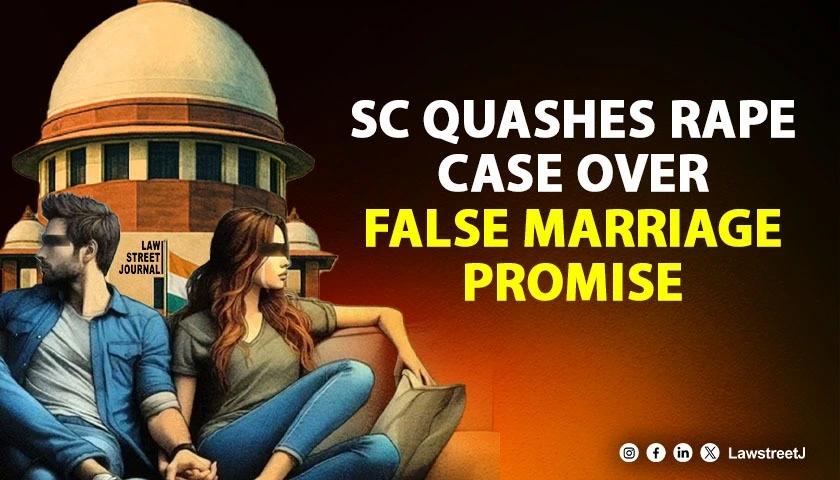New Delhi: The Supreme Court has quashed criminal proceedings in a rape case alleging false promise of marriage, emphasizing that continuation of such proceedings would constitute a “gross abuse of the process of law” where allegations are frivolous and vexatious.
A bench comprising Justice J.B. Pardiwala and Justice Sandeep Mehta delivered the judgment in Criminal Appeal No. 3831 of 2025, titled Pradeep Kumar Kesarwani vs. The State of Uttar Pradesh & Anr., dated September 2, 2025.
The case arose from a private complaint filed in 2014 by a woman alleging that Pradeep Kumar Kesarwani had raped her in 2010 under the false promise of marriage. The complaint was filed under Sections 323, 376, 377, 452, 504, and 120B of the Indian Penal Code, along with Section 3(1)(10) of the Scheduled Caste and Scheduled Tribe (Prevention of Atrocities) Act, 1989.
The complainant alleged that Kesarwani, who was her fellow student at a coaching institute, had developed a friendship with her and subsequently raped her after tearing her clothes. She claimed he made a video of the incident and threatened to upload it on the internet if she complained to the police. The complainant further alleged that Kesarwani promised marriage but later refused, and when she became pregnant in 2011, he forced her to abort the child.
The Additional Chief Judicial Magistrate, Allahabad, took cognizance of the complaint and issued summons against Kesarwani for the offence of rape under Section 376 of the IPC. The court noted, “Respondent No. 1 Pradeep Kumar Kesarwani is summoned for trial under Section 376 IPC.”
Kesarwani challenged the summoning order before the Allahabad High Court under Section 482 of the CrPC, but the High Court dismissed his application. This led to the present appeal before the Supreme Court.
Mr. Rahul Kaushik, Senior Counsel for the appellant, argued that the complaint was “nothing but a gross abuse of the process of law” and was bereft of material particulars. He emphasized that very vague allegations were levelled and that the complaint was filed after a delay of four years for something that allegedly happened in 2010.
The Supreme Court found significant flaws in the case, observing, “It is very apparent on a plain reading of the complaint, more particularly, considering the nature of the allegations, that the same does not inspire any confidence. There is no good explanation offered as to why it took four years for the respondent no. 2 to file a complaint.”
The court noted several concerning aspects: “Not only was the appellant dragged into the criminal proceedings, but even the parents of the appellant were arrayed as accused. Various other offences have been alleged. This itself makes the entire case doubtful. None of the allegations levelled in the complaint were substantiated by any other independent evidence on record.”
The court further emphasized the serious nature of frivolous complaints, stating, “It is by now well settled that summoning any person on the basis of a frivolous or vexatious complaint is something very serious. This would tarnish the image of the person against whom false, frivolous, and vexatious allegations are levelled.”
The Supreme Court referred to its decision in Mohammad Wajid v. State of U.P. (2023), emphasizing that courts must look into FIRs with care when proceedings are alleged to be manifestly frivolous or instituted with ulterior motives for wreaking vengeance.
Distinguishing between rape and consensual sex, the court cited Deepak Gulati vs. State of Haryana, noting, “There is a clear distinction between rape and consensual sex, and in a case where there is a promise of marriage, the Court must very carefully examine whether the accused had actually wanted to marry the victim, or had mala fide motives and had made a false promise to this effect only to satisfy his lust.”
The court laid down a four-step test for determining the veracity of quashing prayers under Section 482 of the CrPC:
- Whether the material relied upon by the accused is sound, reasonable, and indubitable.
- Whether the material would rule out the assertions contained in the charges.
- Whether the material has not been refuted by the prosecution/complainant.
- Whether proceeding with the trial would result in abuse of process and not serve the ends of justice.
The Supreme Court found it particularly telling that the complainant had declined to accept the notice issued by the Court, observing, “The fact that the complainant thought fit not to even accept the notice issued by this Court is one additional ground that she was not at all serious right from day one.”
Finding that the Additional Chief Judicial Magistrate had committed an error in passing the summoning order and that the High Court had overlooked relevant aspects, the Supreme Court concluded, “We need not say anything further in the matter as we are of the view that continuation of the criminal proceedings against the appellant would be nothing but gross abuse of the process of law.”
The court criticized the High Court’s failure to exercise its inherent powers, stating, “In such circumstances, the High Court should have exercised its inherent powers under Section 482 of the Code for quashing of the criminal proceedings.”
Allowing the appeal, the Supreme Court set aside the High Court’s order and quashed Criminal Case No. 655/2014 pending before the Additional Chief Judicial Magistrate.
Case Title: Pradeep Kumar Kesarwani vs. The State of Uttar Pradesh & Anr.











